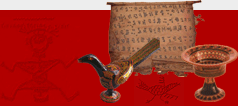|
漫谈彝族文字的文化内涵
The Cultural Connotations of Yi Writing
李生福 Li Shengfu
中央民族大学中国少数民族语言文学学院语言文学系
【摘要】彝族具有悠久的历史,文化源远流长。彝族文字,作为一种自源文字体系,千百年来一脉相承,显示出顽强的生命力。彝文在漫长的历史发展进程中记录并留下了极为丰富的文献典籍,为彝族文化乃至中华民族文化的传承立下了不朽的功绩。彝文古籍中保留了彝族历史、文化、伦理、风俗、医药、科技等方面非常宝贵的知识,这是一笔十分珍贵的文化遗产。(任何一种文字,其文化的含义是非常丰富的,广义地说,人类历史所创造的一切物质财富和一切精神财富都是文化;狭义地说,文化主要指的是精神文化和制度文化;指的是社会意识形态、风俗习惯以及社会制度和社会组织等。)
彝族人民在认识和改造物质世界的同时,创造、丰富了自己的语言、文化。文字作为语言的书写符号系统,把瞬间即逝的语言固化为视觉符号,要研究文化就离不开文字,因为人类的历史、人类的文化大都是用文字记录下来的。
关键词: 彝族 彝族文字 古籍 彝族文化
Abstract
As a writing system developed from Yi language, the Yi
writing system has been passed from generation to generation
for thousands of years, which shows its own competing strength
in the cultural biology. It has made great contribution
for the Yi ethnic group or even for the whole Chinese people
by recording many historical events and leaving us many
documents in the long course of the history. And the Yi
historical documents recorded the precious knowledge on
Yi history, culture, morality, customs, traditional medicine,
and technology. As a writing system, it changed the speeches
and idea or thought into the signs which are much easier
to preserve in history. Therefore, the Yi writing system
is the base on which the researches of the Yi history, culture
and other fields are built up.
Keywords: Yi ethnic group─the writing system─Yi historical
document─Yi culture
作者简介:
李生福,男,彝族,1956年4月出生于云南省楚雄彝族自治州双柏县大麦地乡底土村。1981年毕业于中央民族大学语文系毕业并留校任教至今。最后学力为硕士研究生班毕业。现在中央民族大学语言文学系工作,主要从事彝族历史文献、彝族语言文学与文化的教学和研究工作。讲授课程有:《彝族历史文献与选读》
、《民族古籍与文化》、《彝族文化》、《彝语文》《彝语基础》、《宗教学简论》、《书法理论与实践》等。主要著作与成果:(1)著作:《彝语南部方言研究》(专著)、《现代彝语》、《彝文文献选读》、《彝文文献学概论》、《中国少数民族古籍学》、《中国少数民族古典文献学》(合著),译著有:《红白杜鹃花》、《西行取经记》、《雪峨传说》、《指路经译集》(南部方言部分)等。(2)论文:《云南彝族创世史诗同源异流浅析》、《一幅古朴疑重的彝族古代生活画卷》、《彝语助词略论》、《四省区彝族文字比较研究》、《古彝文及其造字法新论》、《论彝族文字的社会性和群众性》、《彝族文字、典籍及其他》、《浅谈宗教的社会作用》、《彝文“红白杜鹃花”的思想与艺术特色》、《雪峨传说初探》、《西部开发与彝族地区发展》等。
About the Author:
Li Shengfu, male, master degree, was born in Shuangbo
County, Chuxiong Yi Autonomous Prefecture, Yunnan Province
in April 1956. Graduating from the Central University for
Nationalities in 1981, he has taught in the University while
engaged in the research on the Yi historical documents,
the Yi Literature and Yi culture. He has published more
than 10 academic works and over 30 papers.
|





